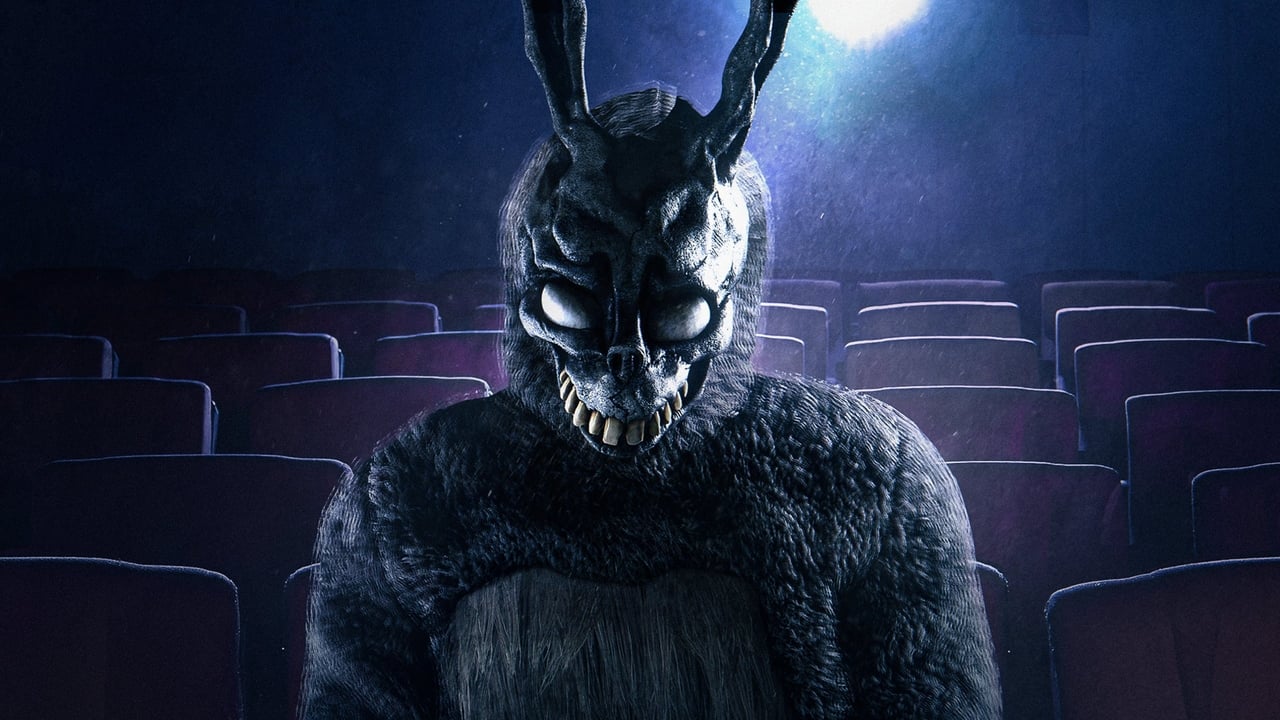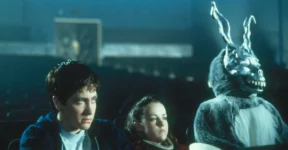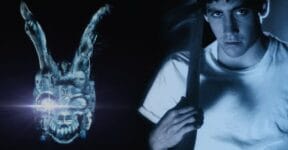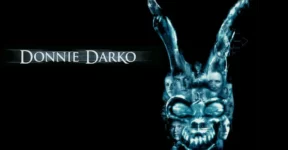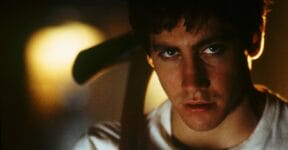Donnie Darko, directed by Richard Kelly, is a cinematic masterpiece that has baffled and captivated audiences since its release in 2001. This mind-bending cult classic blends elements of science fiction, psychological thriller, and coming-of-age drama into a narrative that challenges viewers to question reality, time, and the human psyche. In this blog, we will delve deep into the intricate layers of Donnie Darko, analyzing its themes, characters, and the enigmatic plot that continues to perplex and provoke discussions among film enthusiasts.
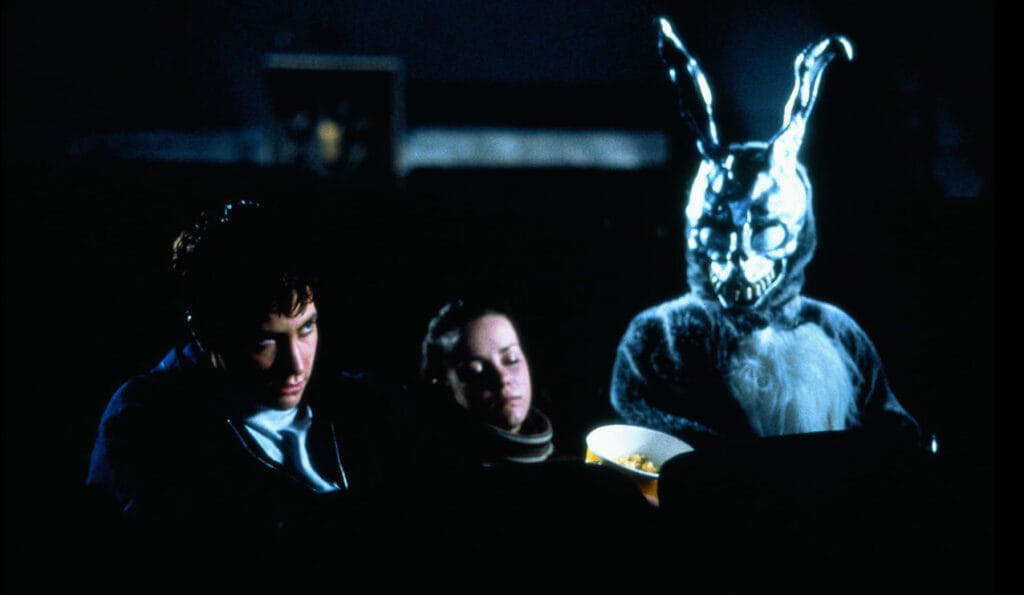
The Premise: A Glimpse into Donnie’s World
At its core, Donnie Darko is the story of a troubled teenager, Donnie, portrayed brilliantly by Jake Gyllenhaal, who is plagued by apocalyptic visions and a mysterious, larger-than-life rabbit figure named Frank. Set in the late 1980s, the film takes place in the quiet suburban town of Middlesex, where Donnie navigates the challenges of adolescence while grappling with a looming sense of doom.
Themes and Symbolism: Unraveling the Layers
1. Time and Destiny: Donnie Darko is, at its essence, a time travel narrative. The film introduces the concept of a “tangent universe” and a manipulated living, where Donnie is chosen to correct a course of events that could lead to the end of the world. The theme of predestination versus free will is a central focus, leaving viewers pondering the extent to which Donnie has control over his actions.
2. Existentialism and Isolation: Donnie Darko explores the existential crisis that many adolescents face. Donnie grapples with feelings of alienation and disillusionment, which are intensified by the dark and uncertain future he envisions. The film invites us to contemplate the existential dread that accompanies growing up.
3. The Masks We Wear: Throughout the film, characters wear metaphorical masks to hide their true selves. Donnie, his family, and even his therapist conceal their inner turmoil and vulnerabilities. This theme encourages us to reflect on the facades we all wear in our daily lives.
Visuals and Soundtrack: The Artistry of Donnie Darko
Richard Kelly’s direction in Donnie Darko is nothing short of masterful. The film’s moody and atmospheric cinematography captures the eerie essence of Donnie’s world, creating an unsettling yet immersive viewing experience. Coupled with a hauntingly evocative soundtrack featuring songs like “Mad World” by Tears for Fears, the film’s audio-visual elements elevate its emotional impact.
Character Study: The Enigmatic Donnie Darko
Jake Gyllenhaal’s portrayal of Donnie is both enigmatic and haunting. Donnie’s descent into madness and his struggles with existential dilemmas are depicted with a raw intensity that makes him a truly memorable character. His interactions with those around him, including his family, friends, and love interest Gretchen Ross (played by Jena Malone), shed light on the complexities of human relationships.
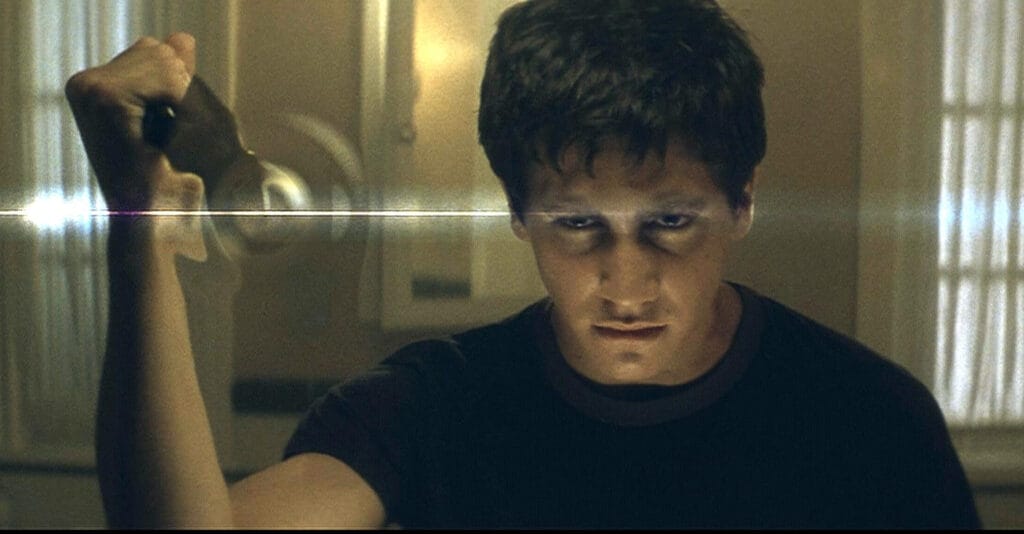
The Ending: Open to Interpretation
As Donnie Darko nears its conclusion, the narrative becomes increasingly surreal and dreamlike. Without revealing any spoilers, the film’s ending is intentionally ambiguous, leaving viewers with more questions than answers. It challenges us to consider whether the events that transpired were real or simply a manifestation of Donnie’s troubled mind.
In conclusion, Donnie Darko is a cinematic puzzle that continues to intrigue and mystify audiences. Its themes of time, destiny, existentialism, and the masks we wear resonate deeply, and its enigmatic plot challenges viewers to engage in deep introspection. Whether you’re a fan of psychological thrillers, science fiction, or thought-provoking cinema, Donnie Darko offers an experience that lingers long after the credits roll. Now, as we conclude our journey through Donnie Darko’s labyrinthine narrative, we invite you to ponder these three questions:
1. Who or what is Frank, and what is the symbolic significance of his character in the film?
2. How does the concept of time travel in Donnie Darko relate to the broader themes of destiny and free will?
3. What do you think is the primary genre or style of Donnie Darko, and how does its genre-blurring nature enhance the storytelling?
We encourage you to share your thoughts and interpretations of this cinematic enigma, as Donnie Darko’s enduring appeal lies in its ability to spark discussion and provoke contemplation.
Other Things You Might Want to Know:
What is the significance of Frank, the rabbit figure?
Frank is a central and mysterious character in the film. He appears as a disturbing, rabbit-masked figure who serves as a harbinger of Donnie’s impending doom. Frank’s true nature and purpose remain ambiguous, adding to the film’s mystique. Is Frank a supernatural entity, a representation of Donnie’s subconscious, or something else entirely?
Frank is a complex character with multiple interpretations. He can be seen as a manifestation of Donnie’s subconscious, a guide through the tangent universe, or a symbol of the fear and uncertainty that plague Donnie. His presence represents the blurred line between reality and imagination in the film.
What role does time travel play in the story, and how does it affect Donnie’s journey?
Time travel is a central element of Donnie Darko’s plot. Donnie is tasked with correcting a sequence of events within a tangent universe, which could lead to catastrophic consequences. The film explores the consequences of altering time and challenges viewers to contemplate the nature of destiny and choice.
They do not present time travel in the film as a conventional science fiction concept but as a metaphysical and existential dilemma. Donnie’s actions and choices in the tangent universe are intricately connected to the fabric of time itself, and the film leaves it up to the audience to interpret the implications of his decisions.
Is Donnie Darko a psychological thriller, a science fiction film, or something else entirely?
Donnie Darko defies easy categorization, which is part of its enduring appeal. It combines elements of psychological thriller, science fiction, coming-of-age drama, and existential philosophy. The film’s genre-blurring nature contributes to its ability to resonate with a wide range of viewers.
We can consider Donnie Darko a genre-defying film that transcends traditional labels. Its blending of various themes and genres allows it to explore complex human experiences and existential questions in a unique and thought-provoking way.
Check out other articles by month:

